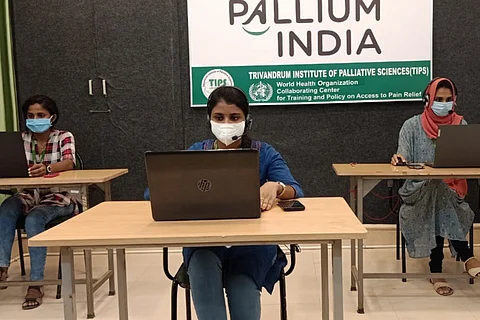

The death of dear ones is one of the worst tragedies in life. COVID-19 has made mourning extremely difficult as people are denied the chance to give the final goodbye kiss or even see the face of their dear ones. While government and voluntary groups are providing psychological support to COVID-19 patients and those in quarantine, an NGO based in Kerala is lending a helping hand to the bereaved families across India, to help them cope with the sudden loss of their dear ones. Pallium India, a Thiruvananthapuram-based non-governmental organisation, has set up a national helpline called Sukh-Dukh helpline, to provide the grieving families of COVID-19 victim(s) with timely emotional support, before intense grief spirals into serious mental health conditions like depression.
Officially launched in October 2020, the Sukh-Dukh helpline service is available in eight languages — English, Malayalam, Tamil, Telugu, Kannada, Hindi, Assamese and Bengali. The team comprising trained and experienced psychologists and counsellors provide emotional support to bereaved families. Pallium India has collaborated with its partners – Caregiver Saathi, MIND India and Edjacklegs — to offer services. The free service is available via a call at 759 4052 605 or mail at sukhdukhhelpline@gmail.com.
Dr MR Rajagopal, founder and chairman of Pallium India, said that people would find it extremely difficult to manage the death of dear ones, especially in case of a disease like COVID-19, where they are isolated. “In normal circumstances, the rituals performed at funerals could provide some respite to the bereaved. The family members could give the final kiss and they will be surrounded by relatives who could console them. But all these are missing in the pandemic situation,” said the palliative care physician.
He said that that the helpline is underutilised. “Although the helpline has been active since October 2020, we have not been receiving many calls,” he said, adding, “Family members will find it hard to cope with this situation during the pandemic. Going through severe trauma, it is unlikely that they will seek professional support. We expect relatives and friends to nudge them to seek help.”
A helpline for the grieving is not a new concept for Pallium India, which has been working in the palliative care sector for nearly two decades. “Even after the death of palliative care patients, we would continue the house visits to check the psychological wellbeing of the dear ones. We used to regularly hold a monthly meet-up of bereaved persons, titled ‘Unarvu’, before the pandemic,” he said.
Although the team consists of experts trained in counselling and psychology, handling grief needs another set of training, said Dr Rajagopal. “Ahead of the formal launch in October 2020, we prrovided them with online training in grief counselling,” he added. Pallium India has also trained volunteers working from various parts of the country, including New Delhi, Bengaluru and Thiruvananthapuram, to provide counselling and support.
A volunteer said that in order to maintain the anonymity of the caller, the calls are first handled by a psychologist. The beneficiary is then connected to the counsellor according to their preference based on factors such as language and time. The follow-up activities are handled by the psychologist. “Some people are reluctant to speak in the first session. Anonymity and indirect communication make people open up eventually,” said a volunteer who requested anonymity.
Dr Rajagopal said that they also get calls from health care professionals. “Grief of health care professionals who go through needless deaths and sufferings every day at the time of pandemic is often ignored. It is seen as part of their jobs,” he said, adding that the helpline also aims to address such issues.
The free helpline service is available via a call at 759 4052 605. People can also send an email at sukhdukhhelpline@gmail.com.
Jisha Surya is an independent journalist living in Kerala.